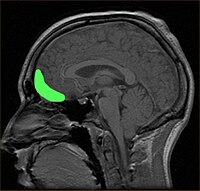
Photo from wikipedia
Future-oriented decision-making is an important adaptive behavior. In the present study, we examined whether decision-making varies as a function of socioeconomic status (SES) using the Children's Gambling task (CGT). We… Click to show full abstract
Future-oriented decision-making is an important adaptive behavior. In the present study, we examined whether decision-making varies as a function of socioeconomic status (SES) using the Children's Gambling task (CGT). We administered the CGT to 227 children (49% female, 48% low SES) between the ages of 5 and 7 years. After completing the CGT, we assessed children's knowledge of the reward/loss contingencies. Data analysis was conducted through multilevel modeling. Fluid intelligence, as measured by the Test of Nonverbal Intelligence, was included as a covariate in the analysis. Overall performance differed between SES groups. Children from middle/high-SES backgrounds learned to choose more from the deck with higher future reward. In contrast, children in the low-SES group did not act in a full future-oriented manner. No differences were found in the level of explicit understanding of the task reached by the two SES groups. Whereas middle/high-SES children with higher knowledge of the game performed better on the last blocks of the task in comparison with their same-SES peers with no understanding, low-SES children with higher explicit knowledge did not exhibit an improvement in their decision-making strategy in comparison with their same-SES low-awareness counterparts. Fluid intelligence did not predict CGT performance, suggesting that SES differences were not mediated by reasoning capabilities. The finding that children from low-SES families continued exhibiting an immediate reward-oriented strategy despite being aware of deck contingencies fits with (although speculatively) the evolutionary-developmental framework. (PsycInfo Database Record (c) 2022 APA, all rights reserved).
Journal Title: Developmental psychology
Year Published: 2022
Link to full text (if available)
Share on Social Media: Sign Up to like & get
recommendations!